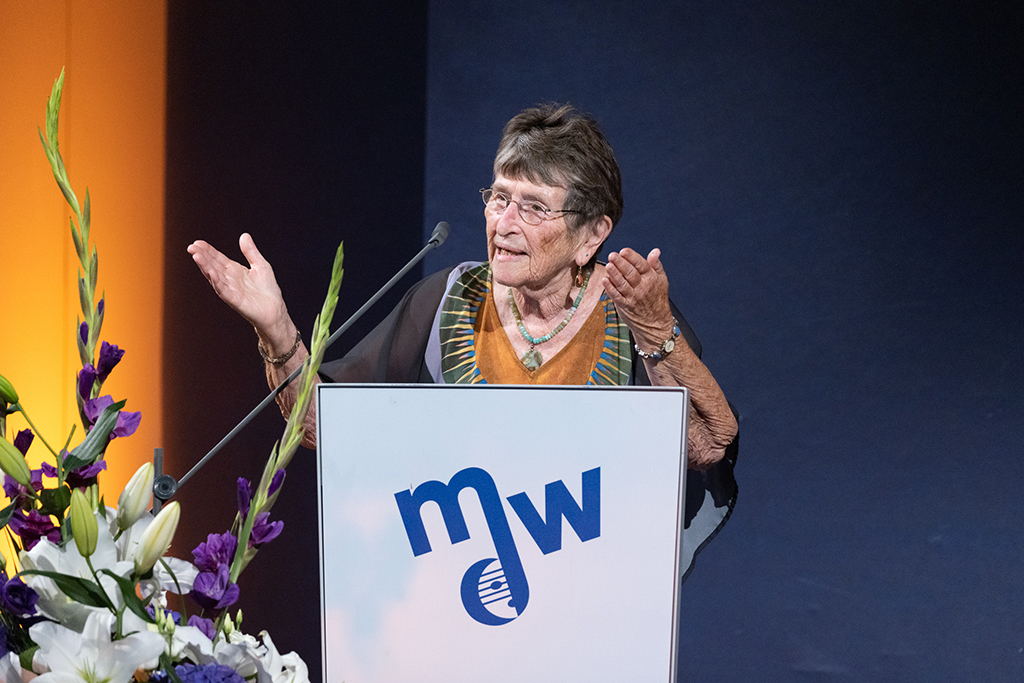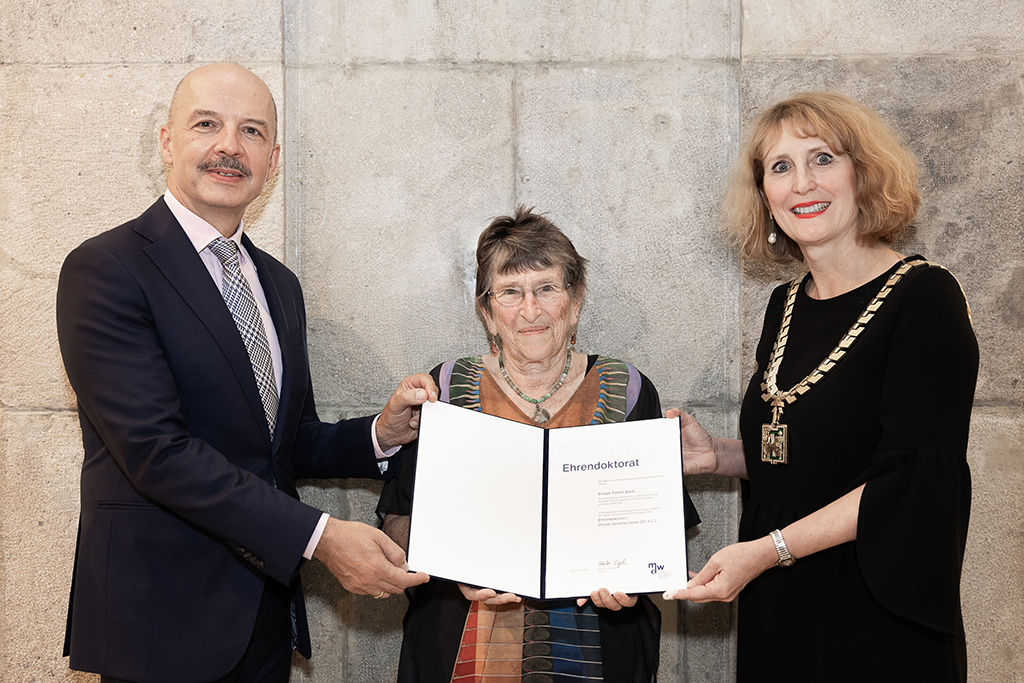Evelyn, this September1 will see you—as a professor emerita at the Department of Women, Gender, and Sexuality Studies at the University of Maryland, College Park and a holder of PhDs in comparative literature and clinical psychology—presented with an honorary doctorate from the mdw for your outstanding academic work. In you, we will be honouring a researcher who has opened up an exceedingly rich spectrum of topics to science and academia. You have been responsible for pioneering achievements in many areas. But in this conversation, let’s single out a few dimensions from your time at the University of Wisconsin – Madison and at the University of Maryland, where you established the Women’s Studies programme in the 1970s.

Evelyn Torton Beck (ETB): Certainly—although anyone who really wants to get to know me needs to start with Kafka. I showed in great detail how Kafka was influenced by Yiddish theatre, a fact that contributed centrally to his breakthrough. Absent this influence, he wouldn’t have become the Kafka we know today, with essential themes like the relationship between father and son and between human beings and authority, as well as what it means to be Jewish—even if this word doesn’t appear in any of his works. I also wrote about him and Else Lasker-Schüler. She, too, wanted to know what it means to be a Jew, as well as a woman and an artist. And Jewishness, just like the questions of what it means to be a woman and of how to deal with authorities, runs throughout my work. These are questions about identities both historical and cultural. But feminism, among whose US pioneers I’m privileged to count myself, changed everything.
How did your research interests end up shifting?
ETB: It’s important to stress the fact that we had to battle our university’s administration for a long time before women’s studies was ultimately accepted as an academic discipline. And once it was, my focus shifted decidedly to the rediscovery of women—authors, painters, composers. Back then, no one knew about Frida Kahlo or Clara Schumann! And it was also very important to query how we were doing research. It’s in this period that the roots of standpoint theory are to be found. There exists no knowledge that comes from nowhere. Even in research, we always speak from a position. This is the idea from which the themes of diversity and—as we say today—intersectionality developed. How does the world look from my perspective? I’m not just a woman—but a white woman, a black woman, a Jewish woman, with different social, sexual, cultural, national, and religious backgrounds. And with this new knowledge, I returned to Kafka. In Why Kafka? I queried just what had been so important to me in dealing with his work. The first pages of The Trial, where the two agents come and arrest Josef K.—that was my life. I had experienced that myself.
This brings us to your own biography. After all, your research has been based on highly specific experiences and perspectives. You were born in Vienna but fled from the National Socialist regime together with your family in 1939 once your father had been released following a year spent in prison and at the concentration camps of Dachau and Buchenwald.
ETB: After spending a year in Milan, where I learned Italian, we were lucky enough to make it to the US, where I’ve been living ever since. But last week, I was once again given Austrian citizenship. I’m very happy that I survived and have managed to have such a rich life. But the wounds and traumas of childhood are still with me. I think that all of my research and everything I’ve fought for has its roots in these experiences. We also shouldn’t forget that back when I established and taught women’s studies, being a feminist and also actually pursuing work having to do with women was a dangerous proposition. Doing so as a lesbian was even more dangerous. So these facts were likewise reasons why the relationship between sex, gender, and sexuality became important in my academic work. And amidst all this, my work on Kafka functioned as a kind of protective shield.
With your academic work concerning voice, language, translation (you translated texts by and together with Nobel Prize laureate Bashevis Singer), concerning social justice in theory and practice, and concerning multiculturalism, sexism, racism, anti-Semitism, and homophobia, including with regard to their effects on the development of the personality (to mention just a few thematic areas), you have challenged not only the substantive foundations of academic research but also—with your questioning of academic, androcentric, and Eurocentric standards—its epistemological foundations, thereby pointing out innovative paths forward. You’ve additionally questioned the classic attitude of teaching, of instruction, setting out in new directions there, as well.
ETB: I also developed pedagogy further towards feminist pedagogy, collaborating with my female colleagues. Being conscious of to whom we’d like to convey something. We refrained from teaching just one type of material, instead desiring to evoke ideas and criticism, encourage contemplation. The academic is also political. I showed, for example, how the history of feminism can be retraced in light of songs. At first the emergence of women’s consciousness as women, then anger and the need to assume their own power, assume agency, and finally the celebration of diversities. One conversation with me bears the title, “I Somehow Survived Everything by Reading”. Art has always been present in my life, my thinking, and my teaching. And in poetry, in music, there is also theory. One example would be a poem by Marge Piercy about bonsai. Such a tree, pruned by men, stands emblematically for what happened to women. What we do always comes from what we think, including in art.

You ultimately arrived at a new perspective on ageing based on your own position and have since become a much-requested speaker on this facet of diversity, which is now enjoying more and more awareness in Europe—including at the mdw event Ageing Trouble in conjunction with International Women’s Day, for which you joined us virtually from Washington…
ETB: Ageism joins forces with ablism and lookism. In Retirement in Two Voices, I also wrote theoretically on the phase of life during which one transitions into so-called retirement and about everything else that moves us during our lives’ second and third halves. How does society’s view of ageing influence us? This, too, needs to be thought in an intersectional manner. It makes a difference, for example, whether someone is wealthy or has only little money.
All of your research and writing, Evelyn, is still of immense significance even today. We are privileged to be able to build upon it, and we are most pleased to be able to honour you. Many thanks!
